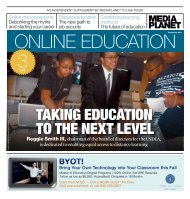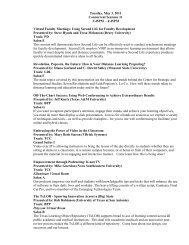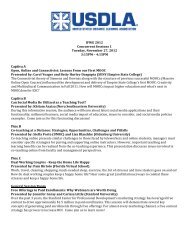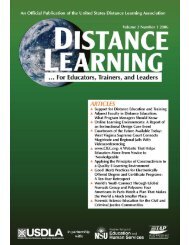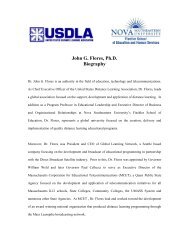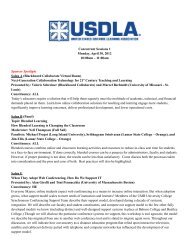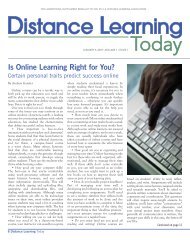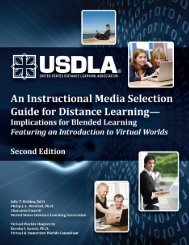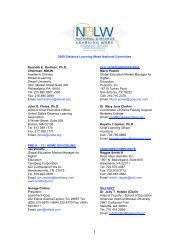United States Distance Learning Association
United States Distance Learning Association
United States Distance Learning Association
- No tags were found...
You also want an ePaper? Increase the reach of your titles
YUMPU automatically turns print PDFs into web optimized ePapers that Google loves.
coast through by quietly sitting in the back<br />
of the room (Oblender & Glass, 2004).<br />
In online courses, discussion postings<br />
can become an integral part of the grade in<br />
addition to examinations, papers, or<br />
projects. The quality of the postings and<br />
responses from classmates as well as the<br />
mentor create a dialogue that contributes<br />
to forming a learning community in online<br />
courses. Students might not know each<br />
other by face or voice, since they don’t see<br />
each other face-to-face; however, they certainly<br />
feel that they can learn a lot about<br />
each other through online contributions<br />
and reactions to the readings and assignments.<br />
Discussion also allows students to<br />
apply knowledge they have as adults with<br />
life experiences. Typical traditional college<br />
students are 18 to 21 years old and have<br />
limited life experiences, unlike nontraditional<br />
adult students, who often possess a<br />
wealth of life experiences. Adult students<br />
bring a myriad of life experiences, of raising<br />
a family, running a business or working<br />
in industry; they bring a significant<br />
level of experience to class discussion and<br />
can often apply things happening in their<br />
office or workplace directly to the topic in<br />
discussion.<br />
PROVIDING NEEDED SUPPORT<br />
According to Manner (2003), providing<br />
nontraditional students the support<br />
needed to provide a level of technical competence<br />
is of vital importance for those students<br />
new to using computers and new to<br />
online instruction. Some nontraditional<br />
students who apply to TESC may have<br />
very little to no experience using a computer<br />
or using the Internet. TESC provides<br />
essential support services through their<br />
advising department; they are experts at<br />
using the Blackboard system, and are very<br />
familiar with what a student will face.<br />
Advising counselors can talk potential students<br />
through the MyEdison portal in real<br />
time via telephone or face-to-face, and in<br />
many cases going through a sample online<br />
course to have students preview what an<br />
online course will look like, what it’s like to<br />
post a reaction to an online reading, and<br />
what is necessary for them to complete an<br />
assignment. During the application process,<br />
applicants have access to the MyEdison<br />
portal to check on their application<br />
status; access is limited, of course, until<br />
enrollment status is granted. In addition,<br />
admission counselors can provide online<br />
and telephone support for an applicant if a<br />
student needs further help getting acclimated<br />
with Blackboard and using an<br />
online format. During classes, mentors also<br />
serve in an advising capacity; in addition<br />
to grading student work, if a student is<br />
challenged by the technology, one of the<br />
mentor’s jobs is to make sure students<br />
grasp what they have to do next.<br />
While classes are held online with students<br />
posting assignments via the MyEdison/Blackboard<br />
portal, to assure student<br />
identity and alleviate claims of cheating,<br />
students must take a proctored written<br />
exam for most courses. The testing takes<br />
place at sites throughout the country and<br />
all over the world, as needed. Some classes<br />
are now offering an online test capacity,<br />
while most still offer a pencil-and-paper<br />
proctored test.<br />
Another online program designed at<br />
TESC is called e-PAK. Suited for the independent<br />
learner, it is a combination online<br />
course and final examination with virtually<br />
no mentor supervision. Technical assistance<br />
for those unsure of their skills can<br />
still avail themselves of assistance via the<br />
advising department. Students progress<br />
through a sequential series of quizzes on a<br />
particular topic. These quizzes help the<br />
student prepare for a final examination.<br />
Students receive immediate feedback by<br />
reviewing quiz responses they answered<br />
incorrectly and are provided with the right<br />
answers; they then retake a different version<br />
of the quiz so that the new knowledge<br />
that they have learned can be applied. Students<br />
cannot take the next quiz in the<br />
sequence until they pass a quiz for the<br />
Volume 4, Issue 4 <strong>Distance</strong> <strong>Learning</strong> 59



